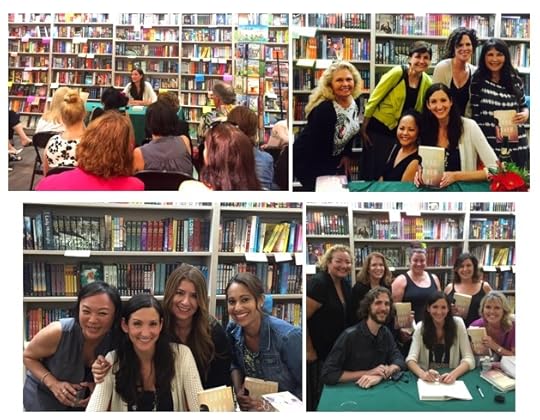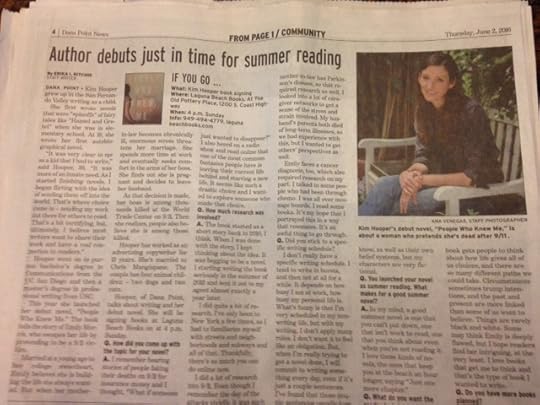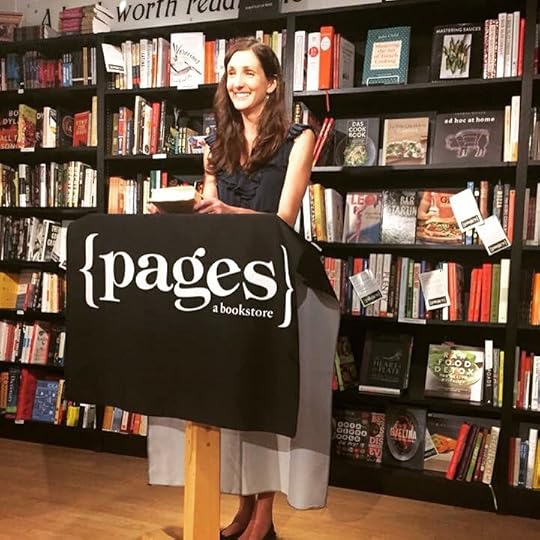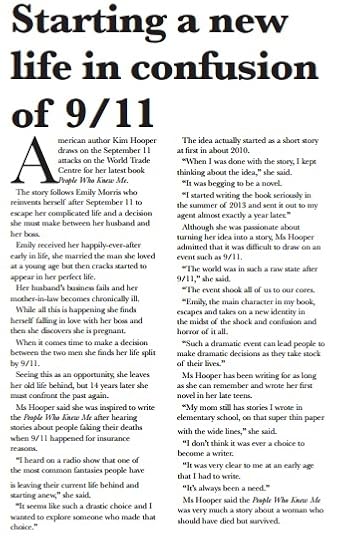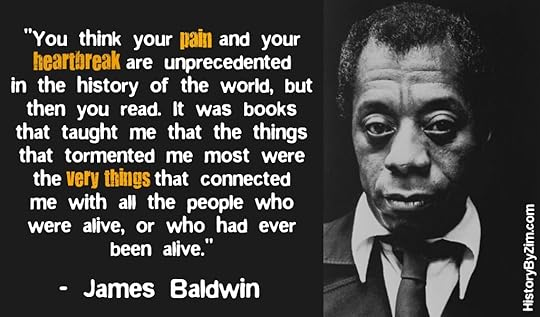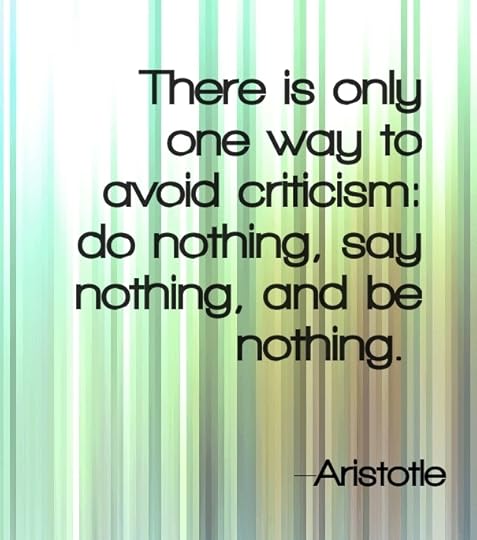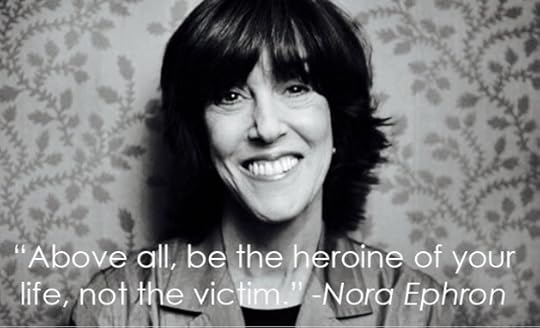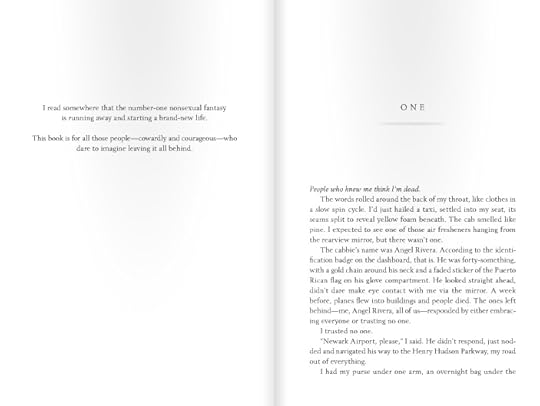Kim Hooper's Blog, page 36
June 6, 2016
Since we last talked
As I type this, dinner is in the oven and my husband is on the phone with Barnes & Noble. He is in the process of calling every store in the country to ask that they have my book in stock. Apparently, this is a necessity. For reasons I don’t quite understand, some Barnes & Noble stores have the book and some do not. I am completely clueless about how distribution works, but we have taken matters into our own hands. It seems to work to say, “I’m the husband of the author. How do we get this in stores?”
Speaking of my adorable husband (he will hate that I used the word “adorable,” but I am one beer in and not caring), he asked questions at my book event yesterday to get the conversation going. Ha. The event was great. I love Laguna Beach Books. I’ve read there before, a long time ago, as part of Dime Stories. There were good vibes all around. My mom brought 20 bottles of wine and I brought some food, so a party was in order.
What else can I tell you?
I was in the Orange County Register this past week. The place I call home has been so supportive. It gives me warm fuzzies.
I had my very first radio interview last week, with Laguna Talks. You can listen to the podcast here. My husband was sitting across from me and caught off guard with questions he was not expecting to answer. Pardon the awkwardness that ensued.
That’s about all for now. I have no idea how the book is doing, sales-wise. That’s probably for the best. I am working on a few sample chapters for a second novel proposal. Wish me luck!
The post Since we last talked appeared first on Fiction Writing Blog.
May 27, 2016
About last night
Last night was my very first book event at Pages in Manhattan Beach. It was a small, intimate affair with a very supportive and enthusiastic audience. I don’t love to be the center of attention (which is why I’m the introverted writer that I am), but I was comfortable last night. It was fun to talk about the book and answer questions. I had one beer beforehand. That helped.
Tips other writers gave me that came in handy:
Keep the reading short (10 to 15 minutes)
Don’t read any passages that include spoilers. I just read from the beginning of the book to avoid this
Bring a gift to the store. I brought an Instagram-friendly succulent
Offer refreshments. The store provided this for me, which was really nice of them–wine, champagne, cheese, crackers, fruit, cupcakes
Consider a small giveaway, something people can take home with them. My mom had pens made with my website address on them
Bring a good pen for signings. The store will have one if you don’t, but it’s good to have one you like
If the store has copies of your book leftover, sign some of them so they can sell them as coveted “signed copies”
Thank you to everyone who came out! It means so much to me.
My next event is at Laguna Beach Books on June 5th at 4pm.
The post About last night appeared first on Fiction Writing Blog.
May 24, 2016
Exciting things on publication day
Today, People Who Knew Me is officially out in the world. Today is also my second wedding anniversary. How’s that for good juju?
The one word I would use to describe today is SURREAL. So surreal. I cannot believe my book is in stores, but here’s proof:
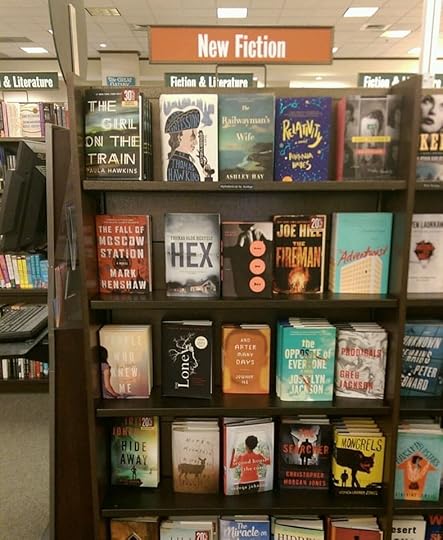
I also found out today that the book is on Audible. I really like the reader they chose. Here’s an excerpt for your enjoyment:
I am still in shock that I was reviewed in the Wall Street Journal this past weekend.
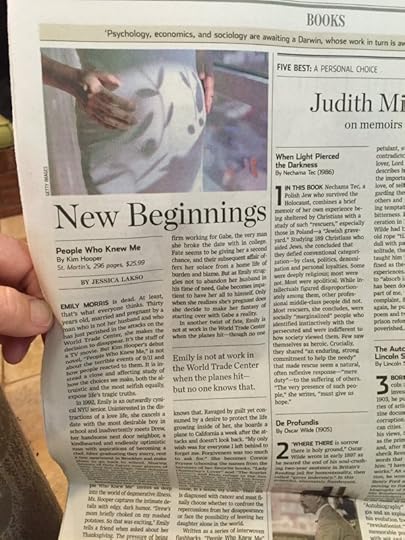
A few quotes in case you missed it:
“Kim Hooper’s debut novel, “People Who Knew Me,” is not about the terrible events of 9/11 and how people reacted to them. It is instead a close and affecting study of how the choices we make, both the altruistic and the most selfish equally, expose life’s tragic truths.”
“Refreshingly raw and honest, “People Who Knew Me” invites us deep into the world of degenerative illness. Ms. Hooper captures the intimate details with edgy, dark humor.”
“Written as a series of interwoven flashbacks, “People Who Knew Me” has a sharp edge of emotional trauma and disappointment. It is very easy to love Emily—she is like any of us, struggling to make the best decisions she can. Ms. Hooper reminds us that control is an illusion, that the past offers no pardons and the choices we make, in turn, make us.”
What else?
I’m getting great reviews from bloggers (thank you, everyone!):
Lost Bookmark
Comfy Reading
A Southern Girls Bookshelf
Read Baby Read
Rebecca Book Review
Read Books Read
Sam Still Reading
Chick Lit Club
Debbish
What else?
The Pan Macmillan Australia team is bringing the book down under. The Shepparton News featured an interview with me recently. I actually heard from a reader in Australia who bought my book at the Brisbane International Airport. SURREAL.

Thursday, May 26, 7pm
Pages, a Bookstore
904 Manhattan Avenue
Manhattan Beach, CA
Sunday, June 5, 4pm
Laguna Beach Books
1200 South Coast Highway
Laguna Beach, CA
If you can’t come to an event, tune into Laguna Talks (KX 93.5) on Thursday, June 2 around 8pm. I’ll be on air LIVE talking about the book.
Before I sign off, a request: If you read the book, please post a review on Goodreads and Amazon. It helps, it really does. THANK YOU!
The post Exciting things on publication day appeared first on Fiction Writing Blog.
May 17, 2016
Publishing Journey: T minus 1 week
It is incredibly hard to believe, but my launch date is ONE WEEK FROM TODAY! It all became real when I came home from work yesterday to a box of 20 books from St. Martin’s. It’s very surreal to see my name on the cover of a book. My husband and I drank champagne while we stared at them.
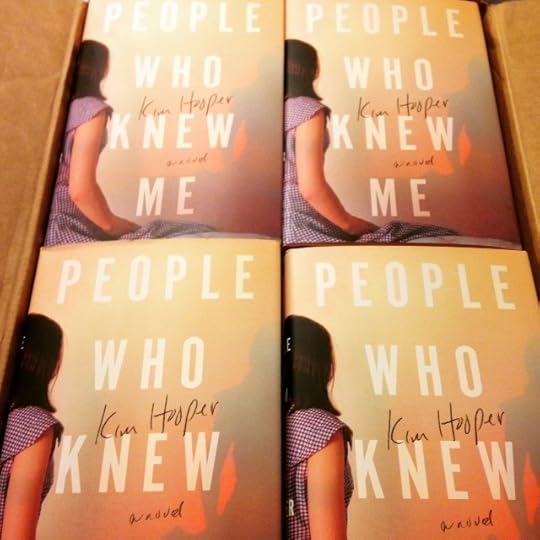
I’m starting to get a little nervous about my launch events. I don’t fear public speaking, but I don’t enjoy being the center of attention. I had to take a shot of tequila before walking down the aisle at my wedding. So, yeah.
If you’re in Southern California, come on out and see me nervous:

Thursday, May 26, 7pm
Pages, a Bookstore
904 Manhattan Avenue
Manhattan Beach, CA
Sunday, June 5, 4pm
Laguna Beach Books
1200 South Coast Highway
Laguna Beach, CA
If you can’t come to an event, tune into Laguna Talks (KX 93.5) on Thursday, June 2 around 8pm. I’ll be on air LIVE talking about the book (and trying not to have a heart attack).
People keep asking if I’m excited and I don’t know what to say. I am excited (because this has been a life-long dream), but I’m nervous about my book being OUT THERE, vulnerable and exposed to the opinions and criticisms of other. And I’m curious. How is this all going to go? Will the book be received well? Will the experience be positive enough to inspire future books? I just don’t know. I’m also focused on writing another book. That’s the fun part for me–the writing. I don’t have control over the rest of it.
So far, I’ve received some great reviews on Goodreads. It’s hard to put into words how rewarding it is to hear from people who “get” the story and the characters. That’s the type of reception I hope I get, overall, though I know there will be negative reviews, too. I’m going to have to learn to let that go. Here are some of my favorite Goodreads blurbs:
“In a simple but carefully thought style, author Kim Hooper constructs and delivers a story that feels real… I believe this is going to be one of the most talked books of the year.” – Renata
“People Who Knew Me is one of the best books I’ve read in a long time. As other reviewers have said, it drew me in on the first page and held my interest all the way to the end. The characters are superbly, amazingly well drawn and the story is compelling. A really stunning debut.” – Nancy
“The storyline was intriguing and hooked me from the very first page. The book is incredibly well-written with excellent character development. This is by far one of the best books I’ve read this year.” – Lisa
“This story had me gripped with all its power and would not let go. Anything could have happened around me and I would not have known. That’s how much I was into this book.” – Debbie
“What made this book so enjoyable is the fact that you can totally relate to the characters. The book was interesting throughout every chapter and I felt sad to have it come to an end.” – Helen
“For me this book highlighted that sometimes life leads you to have to make difficult choices. This great debut novel is honest, very moving and highly recommended.” – Laurel
“I cannot say enough about it, but you will be sorry if you miss reading this one.” – Claire
Seriously, words like those give me goosebumps all over my arms.
The next time I post here, the book will be OUT. Thank you to all of those who read it. It means so much to me.
The post Publishing Journey: T minus 1 week appeared first on Fiction Writing Blog.
May 15, 2016
Why we write: Finding meaning
In the most recent issue of Poets & Writers magazine, the feature article (“The Deepest Place” by Kevin Nance) is about Adam Haslett and his new novel, Imagine Me Gone. The novel is based largely on events and losses in Haslett’s own life, centering around the mental illnesses that infiltrated his family. Haslett says, “The genesis of the book was a sense of having to give meaning to experience that otherwise was unalloyed loss.”
I think this is why all of us writers write–to give meaning to things that seem random and unfair and painful. We want life to make sense, and writing is our way of making sense. By packaging experiences into paragraphs, we create order.
Whenever people ask me if my stories are based on my life, I scoff and say, “No, I write fiction.” But, really, it’s impossible for fiction to be purely fiction. Stories are told from the perspective of one person (the author), and that perspective is inherently influenced by the author’s “real” life. All of the ideas I’m thinking up for my next novel are based on events of the past year of my life. I won’t actually write about those events, but the feelings they stirred up will be baked into each and every chapter. I’m sure of that.
Haslett goes on: “To make meaning out of pain, and to do it communicatively–you write alone, of course, but for the purpose of trying to communicate–is to feel less alone.”
So, if writing fiction is a way of dealing with real-life things, why not write a memoir? For me, there’s freedom in fiction. With fiction, I can go beyond my real-life feelings and explore the “what ifs” that I fear. I can take more risks. I can maintain privacy. I don’t have to worry about being “truthful”; I get to exaggerate with reckless abandon and dramatize the hell out of things. I get to play. But, yeah, ultimately, I’m creating characters and worlds that I hope will help me connect with people in real life. Ultimately, I’m exaggerating and dramatizing very real feelings and I want people to understand those feelings and share their own. I want to, as Haslett says, feel less alone.
A couple past posts related to this one: here and here.
The post Why we write: Finding meaning appeared first on Fiction Writing Blog.
April 29, 2016
On (not) caring what people think, taking reviews in stride, and defending flawed characters
I’m a sensitive person. My mom said once, “Your radar is always up.”
I used to see it as a problem, this pesky radar. I don’t now. The radar is what makes me a good writer. I’m hyper aware of everything around me. I feel things deeply. It can be painful at times, but it also helps me connect to life and articulate experiences.
One downside of this radar is that it’s especially attuned to criticism. In a few weeks, my book will be out in the world (!) and I will have to contend with other people’s opinions of it. This will be a totally new thing for me. I’m a pretty private person, and my writing has always been shared with a select few loved ones (who are aware that I’m sensitive). The world is a scary place. And, frankly, people can be assholes on the Internet, emboldened by their anonymity.
So far, I’ve received two great trade reviews (you can read them here and here). Several people have received advance copies and posted feedback on Goodreads. Most of that feedback has been very positive. But, there have been a few not-so-glowing reviews that mention the same issue: “I didn’t like the main character” or, similarly, “I didn’t agree with the main character’s choices.” It takes everything in me not to respond and instigate a discussion about the beauty of flawed characters. Personally, I’m attracted to interesting characters, and I think flaws make characters interesting. I don’t really care if I agree with a character. I just want to be intrigued.
I don’t respond though. I take a deep breath instead. I need to learn to take reviews in stride. People will interpret my book however they want to, based on their own lives and belief systems. I have zero control over that.
In Big Magic, Elizabeth Gilbert writes about how a reader approached her and said, “Reading about how X happened to you inspired me so much.” But, the thing was, X hadn’t happened to Elizabeth Gilbert and was not in her book. This reader somehow changed the narrative in her head in a way that resonated more with her. This just goes to show that when you write a novel and put it out in the world, it is no longer yours.
There are a couple reviews of my book on Goodreads that get details of my book blatantly wrong but, remembering Gilbert’s story above, I don’t correct people. It’s not my role. If they misread something, it’s probably for a reason. Their psyche is making sense of the book according to their individual needs. And that’s fine.
Gilbert writes:
“I submit that this woman has the God-given right to misread my book however she wants to misread it. Once my book entered her hands, after all, everything about it belonged to her, and never again to me. Recognizing this reality–that the reaction doesn’t belong to you–is the only sane way to create. If people enjoy what you’ve created, terrific. If people ignore what you’ve created, too bad. If people misunderstand what you’ve created, don’t sweat it. And what if people absolutely hate what you’ve created? What if people attack you with savage vitriol, and insult your intelligence, and malign your motives, and drag your good name through the mud? Just smile sweetly and suggest–as politely as you possibly can–that they go make their own fucking art. Then stubbornly continue making yours.”
I’ll always continue making mine. Because I have to. I just hope what I write connects with more people than it offends or alienates. That’s what writing and reading is all about, after all–connection.
The post On (not) caring what people think, taking reviews in stride, and defending flawed characters appeared first on Fiction Writing Blog.
April 23, 2016
Publishing Journey: T minus 1 month
When I got my book deal at the end of 2014, a writer friend told me, “Your pub day will be here before you know it.” I did not believe her. At that time, 2016 seemed SO FAR AWAY. And now, here we are, a month out from my book launch. It’s kind of surreal, as most dreams-coming-true experiences are.
Since my last countdown post, I received another great trade review, this one from Library Journal:
Emily Morris married her college sweetheart, Drew. Like many young couples, they planned to live on love while they both went to graduate school. But life does not always turn out as planned. As they struggle with their professional lives and with Drew’s sick mother, their relationship becomes strained. Connie Prynne is a single mother living in California who has just received a devastating diagnosis of inflammatory breast cancer. With death as a probable outcome, Connie realizes she needs to stop hiding. For Connie is Emily. A pregnant Emily had planned to leave Drew, but then her lover died in the September 11 attacks. Since Emily worked in the World Trade Center, everyone thought she had died, too, and she lets them believe that lie. VERDICT While Emily’s choices may seem selfish to some, the author does a great job of making them believable in this debut. Emily is a flawed, relatable character. The structure of the book—alternating between Emily in the past and Connie in the present—helps readers see how the protagonist has grown. Warmly recommended for women’s fiction fans.—Lynnanne Pearson, Skokie P.L., IL, Library Journal
(Thanks, Library Journal and Lynnanne Pearson!)
As a reminder, I have a couple of launch events lined up if you’re in the Southern California area:

Wednesday, May 25, 7pm
Pages, a Bookstore
904 Manhattan Avenue
Manhattan Beach, CA 90266
Sunday, June 5, 4pm
Laguna Beach Books
1200 South Coast Highway
Laguna Beach,
I also booked a radio show with Laguna Talks (KX 93.5). I’ll be LIVE on air (my husband is limiting me to one beer with dinner beforehand) on Thursday, June 2nd at 8pm.
What else?
I’m working away on finishing a new novel. This will be the second novel I’ve written since I finished People Who Knew Me. I’m hoping one of them will be The Next Book. Meanwhile, my film agent is starting to send out People Who Knew Me, which is exciting. I’m well aware it’s very difficult to get movie deals these days, especially for this type of fiction, so we will see. I wrote the best book I could. Whatever happens from this point forward is gravy.
Thanks to everyone who has been supportive on this journey. The big day is almost here!
The post Publishing Journey: T minus 1 month appeared first on Fiction Writing Blog.
April 10, 2016
Writing as therapy
Nora Ephron was one of the great screenwriters. If you don’t know her name, you know her movies: When Harry Met Sally, Sleepless in Seattle, You’ve Got Mail, Julie & Julia, to name a few. The other day, I stumbled upon the documentary, “Everything is Copy: Nora Ephron, Scripted and Unscripted” and found myself taking notes like a total nerd.
It was her mother, also a screenwriter, who told Nora, “Everything is copy.” Meaning, everything writers experience in this life is potential material. With this perspective, we can find meaning in the greatest of life’s hardships and tragedies. With this perspective, we can gain a sense of control. We can take our most painful moments and turn them into something beautiful (or even funny). As Nora says, “When you slip on a banana peel, people laugh at you. But when you tell people you slipped on a banana peel, it’s your laugh.”
The universe has doled out a lot of shit to my husband and I in the past couple years. We’ve had a lot of loss, a lot of tears. I have read On Grief and Grieving twice. There are plenty of moments when I wonder why we’ve had to deal with so much. I’ve thrown my share of raging pity parties. But then I sit and write and see the proverbial forest for the trees. The shit I face in real life always makes its way into my stories. It’s fictionalized and dramatized and all that, but it’s there. Putting it on the page gives me a sense of control when I feel like I have none. By describing experiences or the feelings associated with those experiences, I achieve some power over them. I contain them. I assign them meaning and purpose. I move on.
Writing has always been my therapy and I can’t imagine surviving life without it. I started keeping diaries when I was in elementary school, not because anyone told me I should, but because I felt like I had to. I don’t keep a journal anymore, but I write emails to myself sometimes, just to vent thoughts. If things stay in my brain, that’s bad. I need to get them out. Talking is good, but can be meandering; writing gives me more concrete understanding (and, eventually, closure). In that way, writing is a selfish pursuit, I guess. Publishing is a different thing. Publishing is communal. Publishing is inviting commentary. That’s why it’s so scary.
I’ve been thinking a lot lately about my second novel. I have two semi-done novels that I love, but I don’t know if either of them will get a thumbs-up from my publisher. And then what? I have no idea, but I do know that I will always write. That’s one certainty in this crazy life.
The post Writing as therapy appeared first on Fiction Writing Blog.
March 26, 2016
Publishing Journey: T minus 2 months
I’m not sure how it’s already the end of March, but it is. My book comes out in two short months, on May 24. I have a couple of launch events lined up if you’re in the Southern California area:

Wednesday, May 25, 7pm
Pages, a Bookstore
904 Manhattan Avenue
Manhattan Beach, CA 90266
Sunday, June 5, 4pm
Laguna Beach Books
1200 South Coast Highway
Laguna Beach, CA 92651
If you come to one of the events, apologies in advance if I seem really nervous. I’ve never done this before, people.
What else? I got my first trade review from Booklist. It will be published on April 15th, but I can share it with you here:
Hooper’s debut novel poses the evocative question, have you ever thought about what it would be like to start your life over? Emily Morris answers that question in the most extreme way possible. On 9/11, while the U.S. is experiencing its first wave of mass terror as the World Trade Towers collapse, Emily, who would have died if she had gone to work that day, makes the rash decision to let her family assume that she was killed so that she can disappear from her life for good. However, as she learns, such a selfish, desperate act rarely leaves the actor truly free, especially when there is a child involved. Readers will ponder Emily’s difficult situation and often disturbing choices as they are glued to this compulsively readable tale. Hooper does not shy away from human nature’s less attractive qualities but rather engages with them head on, asking ever more demanding questions: what must one sacrifice in a marriage? What does it take to care for someone who is chronically ill? What does it mean to love yourself? ―Alison D. Spanner, Booklist
(Thanks, Booklist and Alison Spanner!)
I’ve also received some great blurbs from other authors (huge thanks to all).
“Kim Hooper’s stunning debut novel sucks you in from the first page and doesn’t let you go. Part portrait of a marriage, part suspenseful ‘what would you do?,’ People Who Knew Me will leave readers reeling―and yearning for more.” ―Colleen Oakley, author of Before I Go
“Would you take the chance to disappear from a disastrous life? In People Who Knew Me, Kim Hooper deftly explores the consequences of such a drastic decision―and the risky revelation, down the line, that your past self might offer some salvation after all.” ―Miranda Beverly-Whittemore, New York Times bestselling author of Bittersweet
“Kim Hooper skillfully portrays a courageous woman facing a grave diagnosis, who must confront her difficult past for the sake of her teenage daughter. Absorbing, riveting and utterly realistic, this heartfelt debut novel had me turning the pages late into the night. People Who Knew Me is a perfect book club read.”―A. J. Banner, international bestselling author of The Good Neighbor
“Kim Hooper’s People Who Knew Me hooked me with its first sentence, and from there this excellent debut novel threw surprise after surprise my way. And all of it is anchored by Hooper’s spot-on depiction of a relationship between a mother and the daughter she’d do anything for. This one will touch your heart as you turn the pages faster and faster.” ―David Bell, author of Somebody I Used to Know and Since She Went Away
Last, but not least, you can read the first two chapters of People Who Knew Me with this fancy reader:
The post Publishing Journey: T minus 2 months appeared first on Fiction Writing Blog.
March 16, 2016
Writing: Art and craft
I’m late to the 2014 party and just finished (and loved) Station Eleven by Emily St. John Mandel. As usually happens when I finish a novel I love, I Googled the author for insights into her writing process and found this interesting snippet on The Millions:
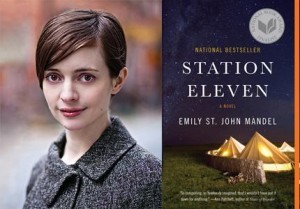 “I took a lot of notes as I was writing the book, and wrote out a detailed timeline. Later that wasn’t enough, so during the later revisions I put together a map of the book in Excel. This was in the final stretch, when I had the basic components of the novel and I was just rewriting and moving pieces around to try to find the best possible structure. The Excel map had notes on what was happening in each chapter, who had the point of view, the page count of each major section, etc. The book has an awful lot of moving parts, so I found the map invaluable in keeping track of everything. I was changing the order of chapters and sections right up until the end.” (Source)
“I took a lot of notes as I was writing the book, and wrote out a detailed timeline. Later that wasn’t enough, so during the later revisions I put together a map of the book in Excel. This was in the final stretch, when I had the basic components of the novel and I was just rewriting and moving pieces around to try to find the best possible structure. The Excel map had notes on what was happening in each chapter, who had the point of view, the page count of each major section, etc. The book has an awful lot of moving parts, so I found the map invaluable in keeping track of everything. I was changing the order of chapters and sections right up until the end.” (Source)
Much to my nerdy delight, there was a photo to accompany this snippet: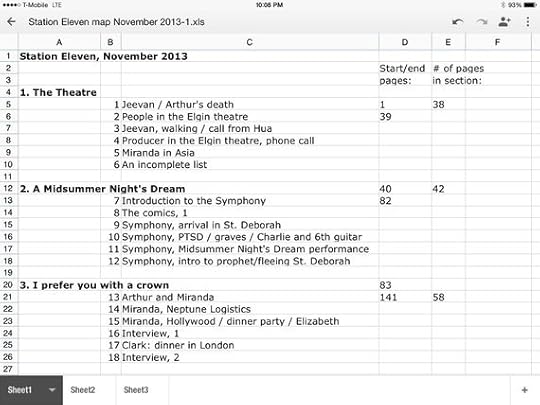
I love this type of insight into the enigmatic writing process. So many writers say that their stories “write themselves.” It’s like they are struck by some kind of artistic lightning and characters just come to life. Other writers say they methodically plan every scene of a story, paying close attention to plot points and character development.
Personally, I fall somewhere in the middle. The initial inspiration for a story is very mysterious to me. I just get ideas and I start writing and the voices of characters emerge. I rarely know how a story is going to unfold; I discover as I go and that’s what makes it fun for me. But, at the same time, while I’m discovering, I start jotting down notes of what I think can/should happen in upcoming chapters–a loose outline of sorts. By the end, I’m somewhat like Emily St. John Mandel, moving around chapters, making schematics of plot points and character developments.
A while back, there was an essay in Poets & Writers magazine called “Preparing for the Worst” by Benjamin Percy. I kept this essay on hand because I’m weird and I thought it was inspiring.
Percy wrote, “When I talk about the bloody business of writing fiction, I sometimes reference the act of mapmaking, blueprinting, planning out a story before beginning it. Often people find this either upsetting–‘You take the fun out of writing!’–or perplexing. ‘How do you graph a story? What is a beat sheet? When and why do certain actions or emotional gateways need to occur in my narrative?'”
He goes on: “First of all, nothing needs to happen in your novel, but it can be helpful to point out some things that commonly do happen. There are no rules, but there are ‘rules,’ certain foundational truths that you should understand and master before breaking away from them, experimenting. Know the ‘rules’ before you ignore them.”
I think this is where outlines and mapping help. They show you the overall flow of the story. I don’t think it’s wise to start stories with these tools; that could lead to creative paralysis. But, when the first draft (the barf draft, I call it) is done, it can be really helpful to revisit the story with a critical eye and look at how the pieces of the puzzle are fitting together.
Percy’s right. Readers do expect certain things. They enjoy certain formulas and will find stories that deviate too much inherently disappointing. I used to resist this, thinking, “It’s not about the readers! It’s my story!” But, really, it is about the readers. If you’re publishing something, it is about the readers.
When I was editing People Who Knew Me, my editor realized the present-day story line (it goes back and forth between past and present) was lacking some urgency and drama, which is necessary to keep the reader’s interest. I was resistant to altering the story, but I did. And then I did a lot of “mapping” and moving things around to enhance the structure. The result? A MUCH better book.
Writing a novel starts with art–a unique vision, often mysterious in origin. And it ends with craft–tweaking and tinkering to make an objectively better experience for the reader. I was stuck defending the art of it for so long, but I’m much more appreciative of the craft now. My philosophy now is to let the words flow for the first draft, then go back and manipulate the words (and sentences and paragraphs and chapters). Art, then craft.
The post Writing: Art and craft appeared first on Fiction Writing Blog.

